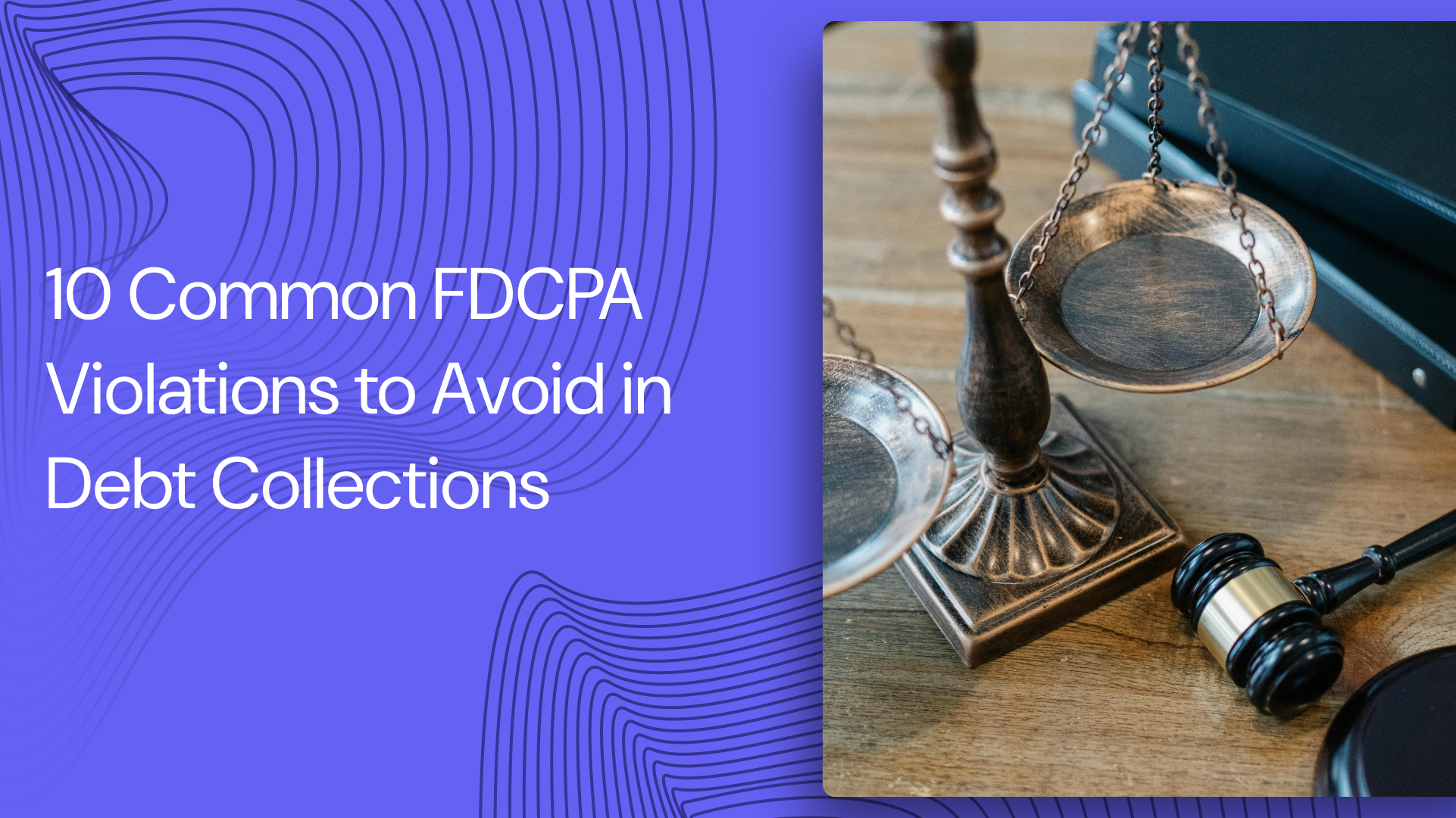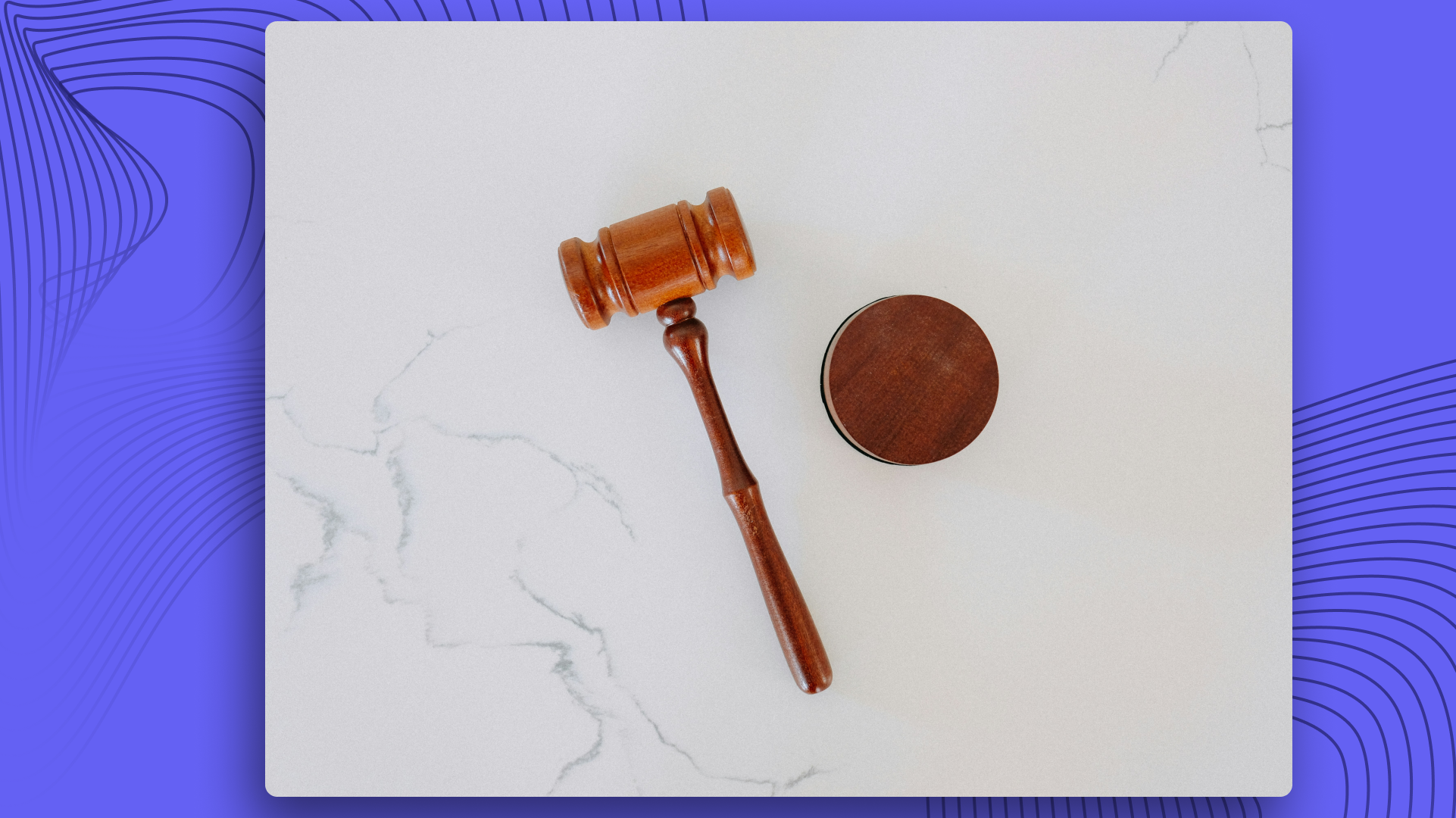10 Common FDCPA Violations to Avoid in Debt Collections

The Fair Debt Collection Practices Act (FDCPA) in the United States has mandated several rules that protect individuals from abusive, deceptive, and unfair debt collection practices. This makes it tricky for debt collection agencies to recoup cash from delinquent accounts while also abiding by these rules.
Data shows that in the past decade (2014-24), more than 525,000 cases were registered by consumers against unscrupulous activities of debt collectors. This necessitates that debt collection agencies understand the appropriate approach when reaching out to consumers, ensuring they are both stern and lawful.
In this blog, we have discussed the 10 most common FDCPA violations that debt collectors often commit and how to avoid them.
What is the FDCPA?
In 1977, the federal government enacted the Fair Debt Collection Practices Act (FDCPA) to safeguard consumers from debt collectors' abusive, unfair, and deceptive practices. The law establishes precise guidelines for debt collectors to contact individuals about overdue debts, with the goal of promoting respect and transparency in the debt collection process.
The FDCPA prohibits debt collectors from engaging in harassment, making false statements, or using unfair means to collect a debt. For example, collectors cannot call before 8 a.m. or after 9 p.m. without permission, nor can they repeatedly contact someone with the intent to annoy. The law also bans threatening arrest, legal action without basis, or misrepresenting the amount owed.
Furthermore, the FDCPA grants consumers the right to contest a debt and request written validation, protecting them from liability for debts that are incorrect or not theirs. Debt collectors must halt their collection efforts until the debt receives validation. This law applies to personal, family, and household debts, offering crucial protections for individuals dealing with financial hardships.
10 Common Violations Debt Collectors Make During Collections

Collections can be tricky as agents often make mistakes in an attempt to maximize recovery. While sometimes they can be harmless, if these mistakes are in violation of the FDCPA and a complaint is raised by the consumer, there can be legal repercussions. Here we will take a look at these common violations and discuss how they can be avoided.
1. Harassing or Threatening Consumers
Debt collectors frequently cross legal boundaries by harassing consumers with excessive calls, abusive language, or threatening actions. This includes repeatedly calling with the intent to annoy or making threats of violence or harm. Such practices are a clear violation of the Fair Debt Collection Practices Act (FDCPA).
How to avoid? Collectors should stick to a professional tone at all times and avoid any form of coercion or aggression. They can set limits on the frequency of calls, follow up through written communication, and maintain polite interactions to prevent harassment claims.
2. Calling Outside Permissible Hours
The FDCPA stipulates that debt collectors can only contact consumers between 8 a.m. and 9 p.m. in the consumer's local time zone. Contacting individuals outside of these hours without explicit permission is a violation.
How to avoid? Collectors can use automated systems to ensure calls are made within the correct time frames. Additionally, collectors should confirm the consumer’s time zone and work within those boundaries.
3. Failing to Provide Debt Validation
One common violation occurs when debt collectors fail to send a written validation notice of the debt within five days of the initial contact. This notice should include the amount of debt, the creditor's name, and a statement informing the consumer of their right to dispute the debt.
How to avoid? Standardizing procedures for sending out debt validation letters immediately after initial contact ensures compliance. Having a process in place for tracking these notices helps avoid missed deadlines and provides a record of compliance.
4. Communicating with Third Parties
Debt collectors cannot reveal a consumer's debt to friends, family members, or employers. The only permitted communication with third parties is to confirm the consumer’s contact information. Sharing details about the debt with unauthorized individuals is a clear violation.
How to avoid? Collectors should be thoroughly trained in FDCPA guidelines regarding third-party communication. One can also implement regular audits to prevent the inappropriate sharing of sensitive debt information.
5. Misrepresenting the Debt
Collectors may sometimes misrepresent the nature or amount of the debt, inflate fees, or falsely claim that legal action has been taken against the consumer. These actions are considered deceptive under the FDCPA.
How to avoid? Collectors should provide transparent and accurate information about the debt. Implementing internal checks to verify the debt details before any communication can help prevent errors. Collectors should also avoid embellishing or exaggerating the consequences of non-payment.
6. Contacting Consumers After a Cease-and-Desist Request
Once a consumer sends a written request asking the debt collector to stop contacting them, the collector must comply. After such a request, the only permissible communication is to notify the consumer that the collector is ceasing collection efforts or to inform them of legal action.
How to avoid? Implement systems that promptly flag cease-and-desist requests, ensuring that all communications are halted immediately. Having a clear process for processing these requests and maintaining detailed records will help prevent violations.
7. Not Identifying as a Debt Collector
Debt collectors are legally required to identify themselves as debt collectors during any communication, whether over the phone or in writing. Failing to do so can mislead consumers and is a violation of the FDCPA.
How to avoid? Collectors should be instructed to never hide their identity in any communication. Scripts for phone calls and templates for written communication should always include this required disclosure.
8. Using False Threats of Legal Action
Some debt collectors resort to scaring consumers by threatening legal action that they do not actually intend to pursue. For instance, they might threaten lawsuits, wage garnishments, or property seizures without having the legal grounds or plans to take such actions.
How to avoid? Collectors should only mention legal actions when authorized and when there is a genuine plan to proceed. To ensure that collectors understand the boundaries of what they can say and avoid using empty threats as leverage, proper training is essential.
9. Ignoring Debt Disputes
When a consumer disputes the validity of a debt in writing, collection activities must cease until the debt is verified. Some collectors fail to respect this right, continuing collection efforts without proper debt validation. This is a clear violation of consumer rights.
How to avoid? Establish a system where disputed debts are flagged immediately and collection activities are paused until the debt is validated. One should establish clear internal policies to acknowledge and resolve every debt dispute in accordance with FDCPA guidelines.
10. Demanding Payment of Time-Barred Debts
Debts are subject to statutes of limitations, meaning after a certain period, they can no longer be legally enforced. Some debt collectors attempt to collect on these time-barred debts, either through deceptive means or without informing the consumer that the debt is no longer legally collectible.
How to avoid? Regularly review the legal status of all debts before contacting consumers. If certain cases permit collecting on time-barred debts, make sure to inform the consumer about the debt's status and their rights before proceeding.
Conclusion
Avoiding FDCPA violations is crucial for maintaining ethical and legal debt collection practices. By following the law, collectors not only protect consumers from unfair treatment but also safeguard their own operations from lawsuits and penalties.
Proper training, clear communication protocols, and adherence to consumer rights ensure a fair, respectful, and effective debt collection process. In the long run, these practices foster trust, minimize disputes, and promote more successful collections without crossing legal boundaries.

